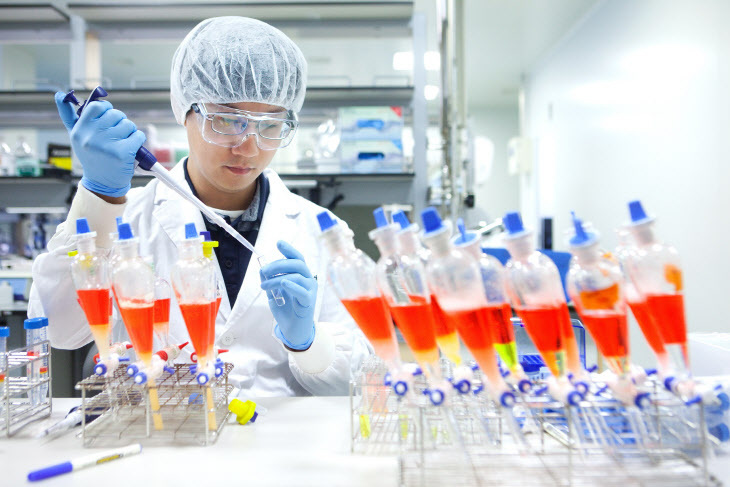Pfizer’s positive clinical phase 3 midterm report of its COVID-19 mRNA vaccine lends optimism to studies worldwide working to develop an armor against the pandemic, pharmaceutical industry insiders in Korea opined Tuesday.
“The US company’s stride does not mean that other vaccine pursuits are meaningless or futile at all,“ one of the insiders mentioned.
With the remarkable feats being achieved through the endeavors of various global pharmas, COVID-19 vaccines are taking shape faster than previously anticipated.
Pfizer CEO Albert Bourla has said he has told President Donald Trump on many occasions that, “We would do it as quickly as science allows us,“ without compromizing safety or efficacy.
In addition to such fast-movers, there needs to be “many types of vaccines researched across multiple timeframes,” another Korean vaccine company official told The Korea Herald.
Vaccines before the age of COVID-19 required at least a decade to research and fine-tune for community-wide use. This is why the experts in the field, in the beginning, had projected it would be impossible to develop a vaccine for the sweeping pandemic, according to the official.
Across the world, there are many other vaccines that are also in clinical phase 3 trial -- the final stage of human tests of the pipeline before they are approved for widespread use.
“Due to the condensed period of time in which COVID-19 vaccines are being sought, if in the case of an approved vaccine fails to deliver intended effect or shows unanticipated side effects in the long-term, there needs to be other vaccine options to fall back on,” a Korean pharma insider said.
Pfizer and its German partner BioNTech announced Monday, US time, that preliminary results from the phase 3 trial of their vaccine suggested that it was more than 90 percent effective. Pfizer stocks surged 7.69 percent on the day, while Korean firm Genexine’s stocks plunged 10.5 percent the same day.
Currently in Korea, there are two early-stage vaccine trials taking place locally under the drive of International Vaccine Institute and homegrown biotech Genexine.
The IVI’s INO-4800 was given the go-ahead from the Ministry of Food and Drug Safety for clinical phase 1/2a trial as of June 2 and Genexine’s deoxyribonucleic acid vaccine GX-19 was also given the greenlight to proceed to clinical phase 1/2a trial on June 11.
SK Bioscience has submitted its clinical design to the MFDS as of Oct. 6 and is awaiting to begin testing its recombinant antibody vaccine.
These firms will only be able to complete development by the end of 2021, at the earliest.
As of Tuesday, in Korea, there were 2,008 people quarantined as precautionary measure against COVID-19 spread. Among the quarantined, 54 were seriously afflicted patients. Korea has so far lost 485 lives to the pandemic.
Once there are viable vaccines in the world, Korea plans to secure them through COVAX, a global initiative to provide every participating nation an equal access to some 2 billion doses of COVID-19 vaccine. COVAX is coordinated by Gavi, the Vaccine Alliance, the Coalition for Epidemic Preparedness Innovations (CEPI) and the WHO.
The government is negotiating independent deals with multinational pharmaceutical companies, too, according to Ministry of Health and Welfare.
In order to facilitate COVID-19 vaccine distribution in the coming months, it is necessary for governments to prepare a cold chain distribution channel that works.
Pfizer’s, for instance, is a messenger RNA, or mRNA vaccine, which requires it stay chilled at minus 80 degrees Celsius before injection.
Korea has recently had a cold chain transportation blunder concerning seasonal flu vaccines that sparked controversy and concerns regarding the safety of the state-sponsored flu shots.
By Lim Jeong-yeo (
kaylalim@heraldcorp.com)








